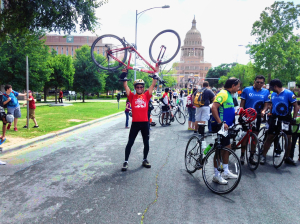On any other given day, you would probably find ECE professor Jose Luis Contreras-Vidal — or “Pepe,” for short — inside of his UH Laboratory for Noninvasive Brain-Machine Interface Systems. Typically, Pepe would be surrounded by eager graduate and undergraduate student helpers as he works to develop cutting-edge brain-machine interface (BMI) systems which allow paralysis patients to control robotic limbs using only their thoughts.
Pepe devotes a great deal of his time, energy, and research efforts to developing novel devices and robots that help paralysis patients regain their mobility and, therefore, their independence and quality of life.
But for two days in April, Pepe was supporting one group of paralysis patients in a different way altogether: by strapping on his helmet, slipping into his cycling shorts, and hitting the pavement on his bicycle.
Pepe was one of more than 10,000 cyclists pedaling the 180 miles from Houston to Austin as part of the 29th annual BP MS 150. This two-day fundraising bike ride — the largest of its kind in North America — is organized by the National Multiple Sclerosis (MS) Society and is sponsored by BP.
There are 100 MS bike rides in cities all over the U.S., but the BP MS 150 serves as the top fundraising ride for the National MS Society nationwide.
“I chose to ride the MS 150 Houston to Austin bike ride to help increase awareness for multiple sclerosis, which is a progressive neurological disease that affects the quality of life and independence of people in many different ways, including paralysis,” Pepe explained.
The BP MS 150 aimed to raise $18 million this year to fund cutting-edge research for MS, such as Pepe’s own work on developing BMI systems and robotic exoskeletons to help paralysis patients regain movement in their limbs.
“I also want to support patients with MS, not only by developing novel biomedical devices and neurorobots in my UH laboratory, but also by helping to raise funding for research that will lead to new discoveries and treatments for MS,” Pepe said.
The money raised from the bike ride will also be used to support programs and services benefiting the nearly 400,000 Americans living with MS.
